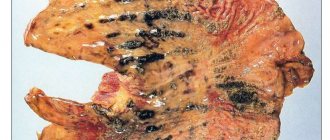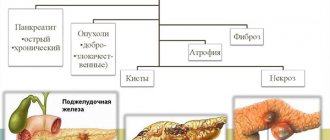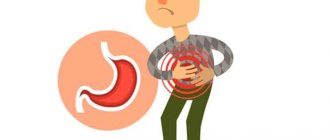The problem of colic in newborns did not arise yesterday or today. Back in the days when most people had no idea about medications, mothers knew how to cope with the symptoms of colic in children using folk remedies, and also knew how to reduce or prevent their manifestations by eliminating one of the causes of colic - swallowing air during feeding.
So, to prevent colic, which can occur due to air entering the gastrointestinal tract during feeding, the mother can take the following measures:
- apply it correctly to the baby's breast so that he does not swallow air along with the milk. To do this, make sure that the baby completely or almost completely grasps the nipple's areola. If the child is bottle-fed, it is advisable to use anti-colic bottles;
- Before feeding, place the baby on his tummy and leave him in this position for a while. If the baby starts to cry, try to distract him so that the duration of lying on his stomach at first is at least 5 minutes. Gradually the time can be increased to half an hour;
- After feeding, you need to hold the baby upright so that he can burp out excess air. This recommendation applies more to formula-fed babies or babies with frequent regurgitation. If a baby is breastfed, it is difficult to overfeed him and thus he is much less likely to regurgitate.
Read more about the features of combating colic on artificial and breastfeeding.
Warmth against colic
Something warm will help soothe the pain in your tummy. There are three main ways to do this:
- The baby is placed on its tummy to the mother's breast. From here the baby receives the necessary portion of heat, which warms the sore spot. In addition, the baby is calmed by tactile communication with his mother - he feels the presence of a loved one.
- A salt heating pad will also help. It heats up to the optimal temperature and transfers heat to the baby. This heating pad is sold in every pharmacy.
- Warm diaper. It works on the principle of a salt heating pad. The fabric is ironed, folded and applied to the tummy.
Causes of infant colic
Most babies suffer from colic.
Infantile colic affects children of both sexes. Approximately 30% of young children suffer from intestinal discomfort.
The word “colic” itself is translated into Russian as “pain in the colon.”
To protect your baby from painful sensations, you need to clearly understand what factors can provoke them. The most common causes of colic in babies are:
- Immaturity of the digestive organs, which leads to excessive gas formation when consuming foods that cause fermentation. This is black bread, fresh fruits, vegetables, dairy. This may be the first complementary feeding, and during breastfeeding, it may be the mother’s excessive consumption of the listed products.
- Dysbacteriosis.
- Pathologies of the gastrointestinal tract, manifested in the reflux of gastric juice into the esophagus. This happens with gastroesophageal reflux.
- Excessively developed sensitivity of the baby to various external factors. This can manifest itself on both a physical and psychological level.
- Infant migraine.
- Incorrectly placed breastfeeding, in which the child swallows air.
- Lactose intolerance.
- The psychological state of the mother, which during breastfeeding is quickly transmitted to the baby.
It is possible to exclude certain factors only by conducting laboratory diagnostics. Since it is difficult to determine exactly what influenced the baby’s discomfort, we must try to exclude all the reasons listed above, because they are all potentially possible.
However, it is necessary to decide what causes colic in parallel with a deep study of the baby’s condition. After all, signs of a serious illness can be attributed to this rather harmless behavioral feature.
Diet for mom
Treatment of colic in a newborn will not bring results if the mother does not reconsider her diet. A woman who breastfeeds her child must follow a special diet. To do this, you should give up milk, many fruits, vegetables, and sweets. Read about what a nursing mother can and cannot eat in this article.
If all these measures do not help, then after consulting a doctor, you can try using medications based on dimethicone and simethicone.
How to overcome colic in babies?
As an advertisement.
Every mother, even with the most modest experience, knows perfectly well what colic is. Why do they arise? How to help your child cope with them? And is it possible to avoid them altogether?
Where does colic come from?
Colic is pain that usually occurs in the baby's intestines around the third week of life and lasts up to 3-4 months. Doctors have not yet come to a consensus regarding the reasons for their appearance.
Some doctors say the cause of colic is improper feeding, when the baby swallows a little air along with the milk. As a result, gases accumulate in the intestines, which provoke discomfort. Other experts attribute colic to the unhealthy diet of the mother herself. If it contains spicy, fried or fatty foods, smoked foods, unprocessed vegetables, baked goods, sweets or caffeine, this can aggravate the situation. Many people tend to believe that colic is a consequence of the baby’s intestinal microflora that is not yet formed and a lack of enzymes for breaking down food. Every day, infants require more milk, while their gastrointestinal tract cannot cope with the growing volumes of food.
How does colic manifest itself?
Recognizing colic is not difficult - the baby will certainly let you know about it with restless behavior. Usually he starts crying or screaming for no apparent reason, especially after the next meal. Often the child cannot fall asleep for a long time or does not want to rest at all. He constantly tosses and turns, pulls his knees up to his tummy, clenches his fists. At the same time, his face may suddenly turn red, the baby begins to strain, and his tummy swells. Refusal to eat also often indicates colic.
In any case, there is no need to panic. It is important to understand that colic is not a disease or abnormality. This is an inevitable stage in the development of the baby’s body. To overcome it without complications, you need to be patient and adopt a few simple techniques that will ease the baby’s painful sensations.
How to relieve colic?
First of all, it is necessary to ensure that the baby is in a comfortable position during feeding. The milk bottle or breast areola should fit tightly to the baby's mouth so that excess air does not enter the stomach. After eating, you need to hold the baby in a “column” for a few minutes, walk around the room a little, gently rocking it. As soon as the baby burps air, you can put him to bed. It is best to put it on your tummy, at least for a while - this way, the gases will go away faster and with minimal discomfort. Massage often helps relieve colic - light circular strokes on the tummy or back in a clockwise direction. Gently bending and straightening your knees helps. Some babies calm down from a short walk in the fresh air, a car ride, or a simple diaper change.
If these measures do not bring results for a long time, you should immediately consult a doctor. He will help you select special children's probiotics - preparations containing beneficial bacteria that will help normalize the intestinal microflora.
Probiotics to the rescue
The probiotic complex Bifiform® Baby can be given even to newborns from the first days of life. Its main purpose is the formation of a balanced intestinal microflora, including for various problems associated with feeding. A special complex of bacteria serves as a good preventive measure for any intestinal disorders, including colic.
The probiotic complex Bifiform® Baby has a very convenient release form: a bottle with an oil solution, closed with a lid. The cap contains 200 mg of probiotic bacteria powder. To prepare the suspension, simply turn the cap and shake the bottle, and the probiotic suspension is ready for the entire course of treatment. The suspension is accurately dosed using a measuring pipette. The frequency of administration is only 1 time per day. An unopened bottle does not require refrigeration and can be stored at room temperature. The prepared suspension must be stored in the refrigerator for no more than 14 days. One package is enough for the entire course, lasting 10 days.
Bifiform® Baby does not contain lactose and can be safely given to children intolerant to lactose. It is safe and does not cause side effects.
Remember, a healthy baby’s intestinal microflora is the key to his well-being and harmonious development. Bifiform® Baby helps in solving this problem.
Bifiform® Baby – certificate of state registration “No.RU.77.99.32.003.E.001621.01.15. Dietary supplement, not a drug
Bifiform Competition
published 04/15/2015 11:58 updated 04/15/2015 — Nutrition
Renal colic - symptoms
The condition develops at different rates - it depends on the size of the stone that leaves the pelvis and concomitant diseases. Pain occurs due to increased pressure in the kidney and stretching of the renal capsule - it is enriched with nerve endings.
Symptoms of renal colic in men and women are similar:
- aching, increasing pain in the lumbar region;
- frequent painful urge to urinate;
- feeling of abdominal distension;
- temperature increase.
The pain becomes acute and unbearable; you should call an ambulance immediately upon discovering the symptoms. The pain syndrome spreads to the thighs, in men there is pain in the groin, in women - on the inner thigh and in the labia majora.
Only an experienced doctor will be able to carry out a differential diagnosis and determine that this is an attack of colic, since the signs coincide with such diseases as:
- appendicitis;
- ectopic pregnancy;
- cysts of the uterine appendages;
- pancreatitis;
- pyelonephritis;
- lumbar radiculitis.
Timely treatment of urolithiasis is the best way to relieve pain from renal colic and get rid of it forever.
What is colic in a baby?
Infant colic is a common behavioral syndrome of regular and prolonged periods of crying, fussiness or irritability that occurs for no apparent reason. When asked when colic begins in a newborn baby, experts answer that it can begin as early as two weeks. How long does colic last in newborns? From half an hour to several hours.
Most often they appear in the evening: at this time the baby cries, presses his legs to his swollen and tense tummy. About 80–90% of children suffer from colic. They cry a lot, and parents worry when the newborn's colic will go away. Symptoms go away on their own without any treatment by the fourth month of life.
Colic in a newborn: what to do
Colic does not require any special treatment because it is not a disease. Popular medicinal and natural carminatives like dill water or simethicone are considered safe, but their direct effect on the cause of colic has not been proven.
One thing is certain - a comfortable and kind atmosphere in the family helps to cope with colic. The baby is having a hard time right now, so it’s better to show him closeness with a gentle voice, smiles and gentle hugs.
Several techniques will help you figure out how to deal with colic in newborns:
- Give the baby a massage. You can stroke not only the tummy, but also the arms and legs. If the baby reacts to touch with even louder crying, then it is better to postpone this method.
- Take it in your arms. Carrying your baby, in your arms or in a sling, doesn’t matter how. The main thing is that he feels the warmth of a loved one. At the same time, you can hum a quiet song or whisper kind words.
- Carry in a column. This will help the baby burp after feeding and reduce the amount of gas.
- To bathe. A warm bath and dim lighting will help alleviate the baby’s condition. By the way, water perfectly cheers up not only the little family members - mother can also take a warm, relaxing bath when the child calms down and falls asleep sweetly.
The condition of loved ones is also very important for the baby. Therefore, you can ask for help from friends or family members to make it easier for your baby to get through this stage of development.
How to avoid a stomach turmoil?
To avoid possible problems with the gastrointestinal tract, you should follow several rules:
Monitor your diet
Nutritionists unanimously say that it is much healthier to eat small meals 5 times a day than to swallow large portions of food just a couple of times a day. Yes, production needs often dictate staying longer at the workplace. But this does not at all exclude the possibility of drinking a glass of kefir or eating a handful of nuts while you are writing a report.
Avoid food waste
Start your morning right - with carbohydrate food, and it would be better if it was porridge. We don’t even mention burgers - we’re just talking about healthy complex carbohydrates. Believe me, a small bowl of rolled oats is enough to live 3 hours without thinking about food. And then you can have a light snack - for example, dried fruits. Lunch should be warm and, preferably, without carbohydrates. Soup is good - it will allow you to eat a third less than if you choose the “second” dish. Or you can eat boiled fish with vegetables. And no desserts. For dinner, it is best to cook something protein - for example, meat. Just don’t combine it with bread or potatoes: protein and carbohydrates are a bad tandem.
Take homemade food with you
In addition to the opportunity to demonstrate your culinary skills to colleagues, taking a container of food with you from home will ensure you are confident in the quality of your lunch. After all, who knows what’s going on in the kitchen of a neighboring cafe: is the cook healthy today, are the products bought fresh, are the dishes washed well, and what kind of living creatures live there?
Drink water
Everything is simple here: 1.5-2 liters of pure still water per day for the proper functioning of the body (at the rate of about 40 ml per 1 kg of weight). Tea and coffee don't count - only clean water.
Move
The abdominal muscles perform a massage function, improving intestinal motility. A sedentary lifestyle atrophies these muscles, and the intestines also begin to function worse. Therefore, find a gym near your home (some of them are open until night), or download a Pilates training course onto your computer.
If you fail, help your body!
If the previous tips did not help, and a real storm has begun inside you or you just feel sick to your stomach, it’s time to use the first aid kit - delay can threaten the failure of all plans for the next day. In this case, it is worth remembering the drug Neobutin® - an innovative domestic remedy against abdominal pain. Its action is based on normalizing the sensitivity of the internal nerve cells of the intestine, eliminating spasms and normalizing peristalsis. Neobutin® eliminates the very cause of pain, preventing its reappearance. Its effect is felt within 20 minutes.
The drug can be used to eliminate abdominal pain not only in adults, but also in children over 3 years of age. Neobutin® will help the whole family!
Available without a prescription.
What can cause pain?
The rhythm of modern life dictates its own rules. Unfortunately, we don't always have enough time for ourselves. Tight deadlines for work, stress, attempts to combine career and family - all this inevitably affects your health.
The human body, like a musical instrument, requires careful treatment and is sensitive to any external changes. The intestines are responsible in the body not only for digestion, but also for immunity - more than 70% of immune cells are located in this organ.











